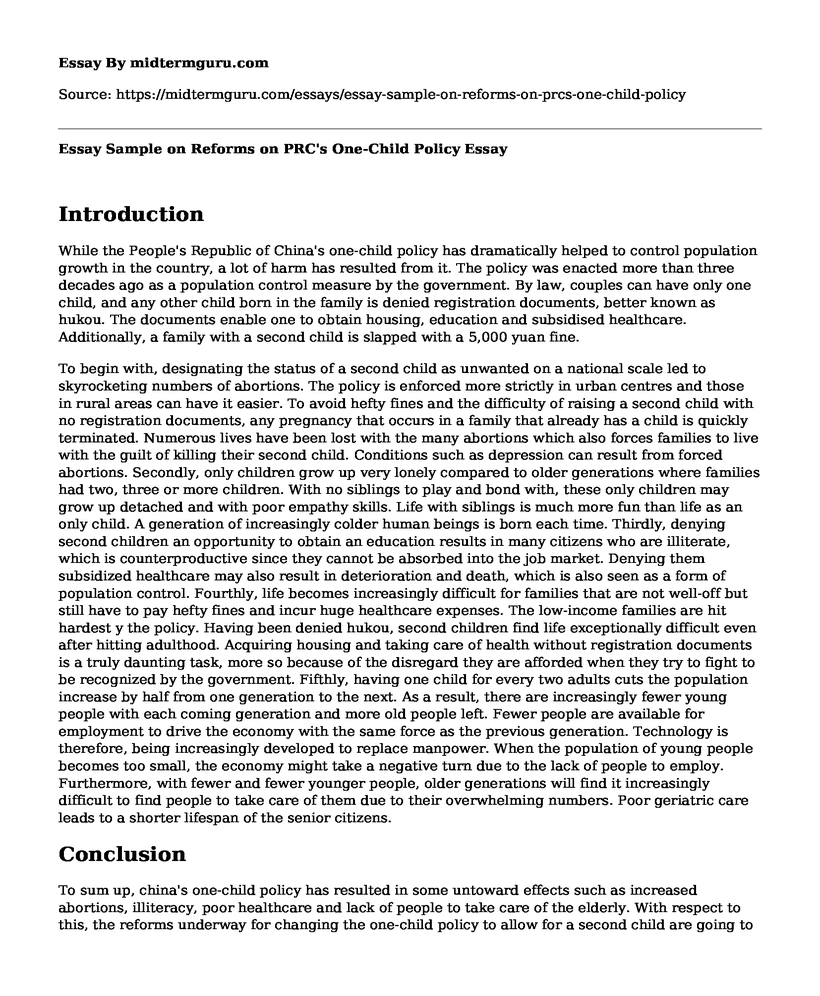Introduction
While the People's Republic of China's one-child policy has dramatically helped to control population growth in the country, a lot of harm has resulted from it. The policy was enacted more than three decades ago as a population control measure by the government. By law, couples can have only one child, and any other child born in the family is denied registration documents, better known as hukou. The documents enable one to obtain housing, education and subsidised healthcare. Additionally, a family with a second child is slapped with a 5,000 yuan fine.
To begin with, designating the status of a second child as unwanted on a national scale led to skyrocketing numbers of abortions. The policy is enforced more strictly in urban centres and those in rural areas can have it easier. To avoid hefty fines and the difficulty of raising a second child with no registration documents, any pregnancy that occurs in a family that already has a child is quickly terminated. Numerous lives have been lost with the many abortions which also forces families to live with the guilt of killing their second child. Conditions such as depression can result from forced abortions. Secondly, only children grow up very lonely compared to older generations where families had two, three or more children. With no siblings to play and bond with, these only children may grow up detached and with poor empathy skills. Life with siblings is much more fun than life as an only child. A generation of increasingly colder human beings is born each time. Thirdly, denying second children an opportunity to obtain an education results in many citizens who are illiterate, which is counterproductive since they cannot be absorbed into the job market. Denying them subsidized healthcare may also result in deterioration and death, which is also seen as a form of population control. Fourthly, life becomes increasingly difficult for families that are not well-off but still have to pay hefty fines and incur huge healthcare expenses. The low-income families are hit hardest y the policy. Having been denied hukou, second children find life exceptionally difficult even after hitting adulthood. Acquiring housing and taking care of health without registration documents is a truly daunting task, more so because of the disregard they are afforded when they try to fight to be recognized by the government. Fifthly, having one child for every two adults cuts the population increase by half from one generation to the next. As a result, there are increasingly fewer young people with each coming generation and more old people left. Fewer people are available for employment to drive the economy with the same force as the previous generation. Technology is therefore, being increasingly developed to replace manpower. When the population of young people becomes too small, the economy might take a negative turn due to the lack of people to employ. Furthermore, with fewer and fewer younger people, older generations will find it increasingly difficult to find people to take care of them due to their overwhelming numbers. Poor geriatric care leads to a shorter lifespan of the senior citizens.
Conclusion
To sum up, china's one-child policy has resulted in some untoward effects such as increased abortions, illiteracy, poor healthcare and lack of people to take care of the elderly. With respect to this, the reforms underway for changing the one-child policy to allow for a second child are going to help China in a great way and should, therefore, be encouraged.
Works Cited
Ke, Feng and Hunt, Katie. The Girl with no identity: Being a Second Child in China, 11th November 2013. https://www.cnn.com/2013/11/10/world/asia/china-second-child/index.html"
Cite this page
Essay Sample on Reforms on PRC's One-Child Policy. (2022, Oct 03). Retrieved from https://midtermguru.com/essays/essay-sample-on-reforms-on-prcs-one-child-policy
If you are the original author of this essay and no longer wish to have it published on the midtermguru.com website, please click below to request its removal:
- Essay on How Social Media Influences Politics
- Essay on the Structure of the American Government
- Commercialization and Privatization of Airports - Essay Example
- Issues That Affect the People of District 7 - Problem Solution Essay
- Paper Example on Roles of Political Parties in Promoting Democracy
- Essay Sample on Social Policy and Economic Policy
- A Look at Healthcare Costs: Limiting Factors for Americans - Essay Sample







